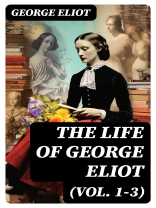In ‘The Life of George Eliot (Vol. 1-3)’, readers are offered a profound exploration into the complexities of Eliot’s life, intricately woven with her literary achievements. This biographical work delves into the psychological and social struggles of the renowned novelist, highlighting her pioneering contributions to the Victorian literary landscape. Written in a reflective and nuanced style, the volumes reveal the intertwining of her personal experiences with her fictional creations, enabling readers to comprehend how her intimate world shaped her narrative artistry. George Eliot, the pen name of Mary Ann Evans, emerged against a backdrop of societal constraints on women in the 19th century, navigating a male-dominated literary environment. Her own experiences of love, loss, and intellectual fervor informed her compelling storytelling, allowing her to craft rich, multidimensional characters. Eliot’s keen observations of human nature and moral dilemmas stem from her philosophical inquiries and personal struggles, marking her as not only a novelist but also an influential thinker of her time. For those intrigued by the interplay of personal narrative and literary production, this comprehensive biography is a vital read. It provides invaluable insights into Eliot’s life challenges and triumphs, enriching our understanding of her seminal works. A recommended read for scholars and fans alike, this exploration captures the essence of a remarkable figure whose impact continues to resonate in literature.
लेखक के बारे में
George Eliot, the pen name of Mary Ann Evans (1819–1880), was an English novelist, poet, journalist, translator, and one of the leading writers of the Victorian era. Her novels, known for their realism and psychological insight, have secured her a place in the literary canon. A writer whose work elucidates the intricacies of human behavior and the societal norms of her time, Eliot’s novels often explore themes such as morality, pastoral life, and the individual’s place in society. Among her renowned works are ‘Adam Bede’ (1859), ‘The Mill on the Floss’ (1860), ‘Silas Marner’ (1861), ‘Middlemarch’ (1871-72), and ‘Daniel Deronda’ (1876). Eliot’s prose reveals her intellect and profound understanding of human emotion and motivation, making her narratives as compelling today as they were upon their publication. ‘The Life of George Eliot’ (Vol. 1-3) provides an extensive insight into the extraordinary intellectual rigor and the emotional landscape behind her literary oeuvre. Believing in the philosophy of realism, Eliot broke away from the romantic notions of her day, utilizing the novel as a platform for exploring philosophical concepts and social dynamics. Her legacy endures not only as a woman who transcended the gender constraints of her time to emerge as a literary figure of great significance but also as a timeless author whose works continue to resonate with contemporary readers.












